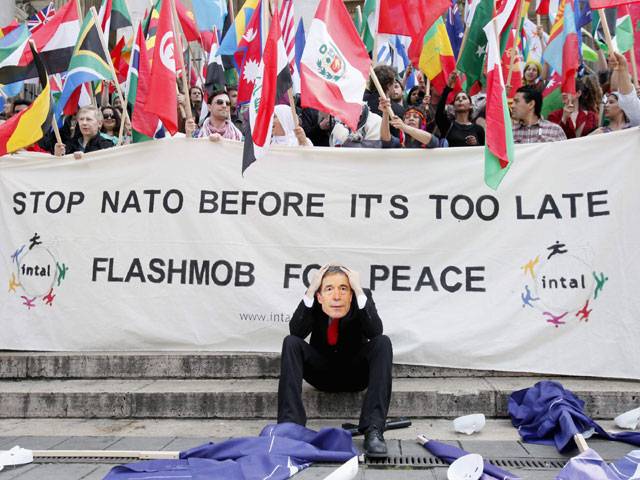CHICAGO - Nato leaders are set to activate the first phase of a US-led missile shield for Europe on Sunday, risking to further anger Russia which has threatened to deploy rockets to EU borders to counter the system.
The declaration by US President Barack Obama and his allies at a Chicago summit will put a US warship carrying interceptors in the Mediterranean and an early-warning radar system under command of a Nato base in Ramstein, Germany.
The alliance insists the shield is not aimed at Russia and aims to knock out missiles that could be launched by enemies such as Iran, but Moscow fears that the system will also serve to neutralize its nuclear deterrent.
"Missile defence is indispensable. We are faced with real missile threats," Nato Secretary General Anders Fogh Rasmussen said on the eve of the summit, adding that 30 states either have or seek ballistic missile technology. "Against a real threat we need a real defence," he said.
The standoff has tested Russian-US relations for much of the past decade and been one of the primary issues addressed by Obama when he launched a diplomatic "reset" with Moscow in 2009.
Russian military chief General Nikolai Makarov said this month one option was for Russia to station short-range Iskander missiles in its Kaliningrad exclave near Poland, a long-running threat that has alarmed Eastern European states.
Nato had hoped that Russian President Vladimir Putin would come to Chicago, but instead he sent a lower level delegation to represent Moscow during the summit's discussion on Afghanistan.
Putin, who returned to power after succeeding his protege Dmitry Medvedev this month, was often at odds with the previous US administration over missile defence in his first two terms of office.
"Russia is sensitive about its nuclear capability because that's what makes it a superpower," said Nick Witney, a London-based defence expert at the European Council on Foreign Relations.
In a bid to appease its former Cold War foe, the Western military alliance invited Russia to cooperate in the system at the last summit in November 2010 in Lisbon, but the two sides have struggled to find common ground.
Moscow has called for joint control over the system and for Nato to sign a legally-binding guarantee that it is not aimed at Russia. But Nato has balked at both demands, insisting on keeping two separate systems and refusing to sign a legally-binding document.
The US election also appears to have affected the pace of negotiations.
An open microphone famously caught Obama telling then president Medvedev in March that he could negotiate some concessions on the system if Russia gave him "space" until after the election this year.
The system is scheduled to be deployed in four phases and become fully operational by 2018.
Spain will host four US Aegis ships at its port in Rota while Poland and Romania have agreed to host US land-based SM-3 missiles in the coming years.
The United States has tested missile defence technology for years but analysts have raised questions over whether the shield is a full-proof defence against incoming rockets from rogue states.
"They have scored successes (in tests) but it's easier to hit things when you know something is about to come than when something is coming out of the blue," Witney said.
"There is a huge number of technical unknowns on both sides of this equation," Witney said, pointing out that there are also doubts over whether Iranian missiles could reach deep into Western Europe.
Saturday, April 20, 2024
Nato to activate missile shield despite Russian anger

Heavy rains claim 98 lives, 89 injuries, across Pakistan: NDMA
1:21 PM | April 20, 2024
Watercourse project to help increase crop yields in Punjab
12:57 PM | April 20, 2024
Justice Ishtiaq Ibrahim sworn in as PHC chief justice
12:54 PM | April 20, 2024
Policitising Tragedy
April 20, 2024
Tehran to Rafah
April 20, 2024
A New Leaf
April 20, 2024
A Tense Neighbourhood
April 19, 2024
Dubai Underwater
April 19, 2024
Dangers of Deepfakes
April 20, 2024
Feudalism
April 20, 2024
Kite tragedy
April 19, 2024
Discipline dilemma
April 19, 2024
Urgent plea
April 19, 2024
ePaper - Nawaiwaqt
Advertisement
Nawaiwaqt Group | Copyright © 2024





